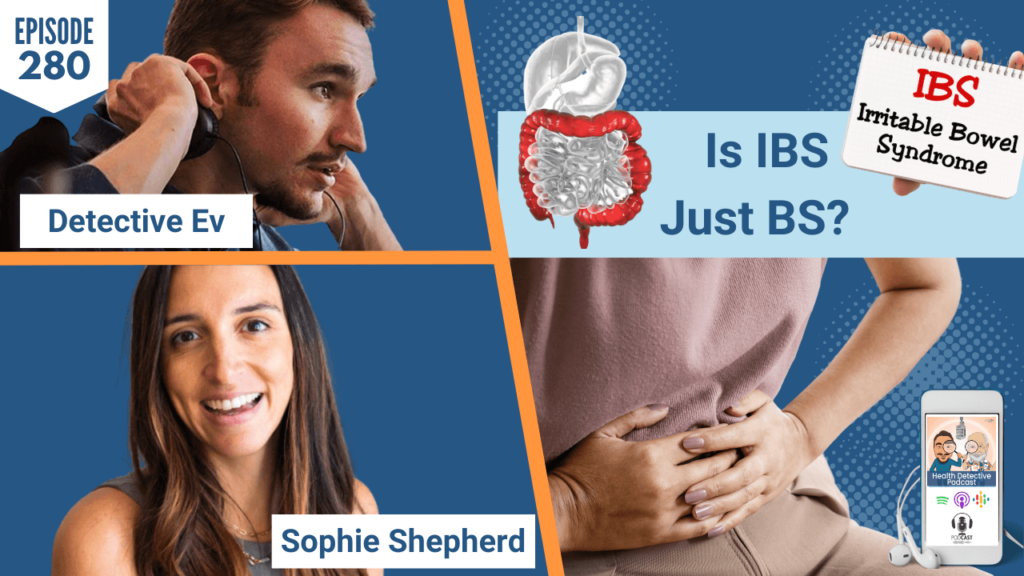Introduction
[00:00:00] Detective Ev: All right. Hello everyone. Welcome to Episode 280 of the Health Detective Podcast. I’ll be your host. My name is Evan Transue, AKA Detective Ev. Our guest today is Sophie Shepherd, who’s asking the question, is IBS just BS? I will introduce her bio in a second.
She’s crushing it business wise. She’s in the hotel traveling right now. I am in a full coat with the FDN logo underneath. Today we’re here to talk about IBS and a whole lot more than that. So, here’s a quick background.
Sophie is the founder of She Talks Health and the creator of the She Talks Health Podcast. She is an FDN practitioner like myself, and an NLP certified life coach who helps women transform their hormone gut and thyroid health.
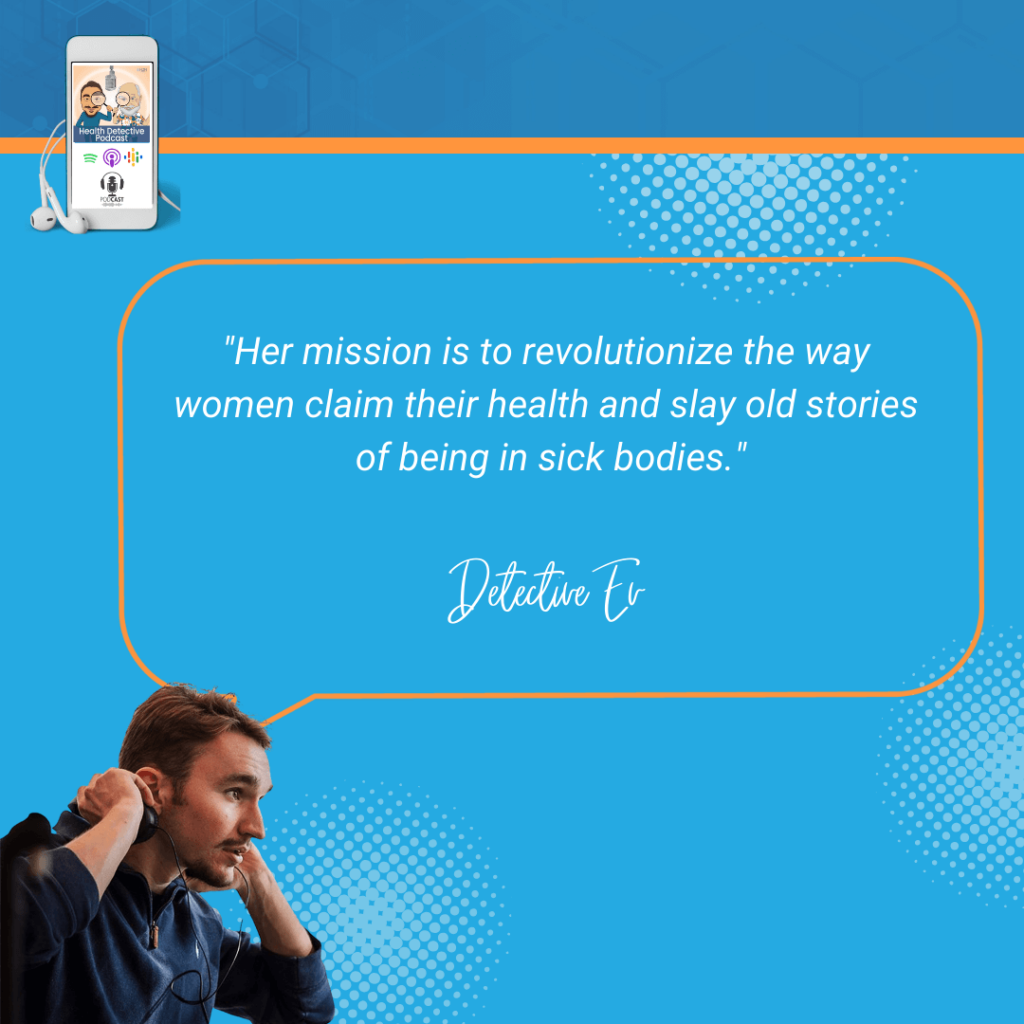
Using a combination of root cause functional lab testing, transformation, subconscious mindset, reprogramming, and diet and lifestyle science, Sophie and her team partner with you to create a holistic approach to bringing your body and mind back into balance. Her mission is to revolutionize the way women claim their health and slay old stories of being in sick bodies. I love that.
So, officially, welcome to the podcast. Thanks for coming on.
[00:01:02] Sophie Shepherd: Thank you. Thanks for introducing me.
[00:01:05] Detective Ev: All right. What we will do today is start in the same way that we prefer to do on this show. I love to hear the stories and then we can nerd out, talk business, but everyone that is an FDN has usually gone through their own stuff.
So, my question for you, Sophie, is when did your health symptoms begin and what were those things looking like back then?
Is IBS Just BS: Out of Control
[00:01:23] Sophie Shepherd: I’m going to tell you a story because I think that’s the best way. So, it was the middle of the night, and I was careening down the highway. My dad was driving the car. It was freezing cold outside.
I was on my way back to school in Pittsburgh. I was a theater student in college, and I had that familiar feeling in my stomach that I was going to have to go to the bathroom. If you’ve ever been in that position where you just don’t have any control, you know what I’m talking about. Not just being your bowels, but also just in control in your life. And I just felt totally out of control going down this highway, 70 miles an hour.
I said, Dad, we got to find a bathroom. I gotta go. I gotta go. And he’s like, you can’t just wait. We’re five miles from school. Been in the car for seven hours. No, I can’t wait. Pull over. Get to the Dunkin Donuts parking lot, jump out of the car, run into the bathroom, and I made it. I just made it. And that was how my life was from when I was 16 until after I found functional medicine and Functional Diagnostic Nutrition and was able to reverse those symptoms.
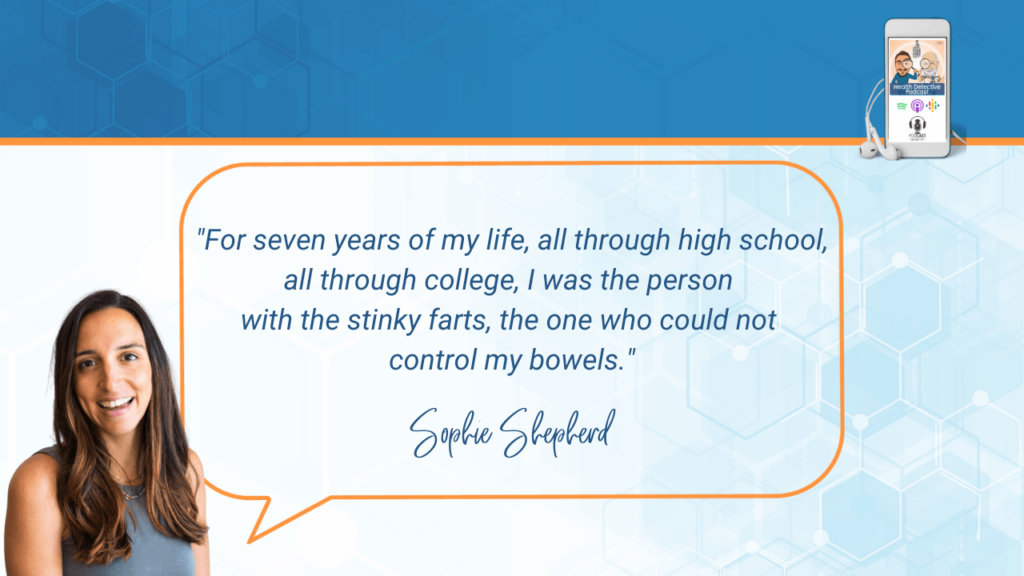
So, I had IBS, air quotes, tell you about that in a second. For seven years of my life, all through high school, all through college, I was the person with the stinky farts, the one who could not control my bowels. I was so embarrassed all the time and trying to hide it, trying to hide myself, not feeling like I had control.
Is IBS Just BS: Bent Over in Pain
It spiraled from there, getting anxiety, getting autoimmune disease later in life, having menstrual cycle issues. As we know, the body is connected. There were all these problems that connected in through the gut. That was a normal thing for me, that kind of story. So that’s some of the symptoms I was dealing with.
[00:03:09] Detective Ev: Okay. When this was going on, I always like to get back into the person’s head because there might be, I say, the lay person, as in someone that’s not interested in functional medicine. They might watch this and might really relate to what you were going through at the time. What was your perspective in those seven years before you found FDN? Was this a, why is this happening to me? Genetics? Was there any thought in your mind that this shouldn’t be happening? Because we always perceive these things completely differently then, versus once we get educated on it.

[00:03:39] Sophie Shepherd: Yeah, I will tell you there was a pivotal moment. I was about 15 or 16 years old, and I was in my kitchen with my boyfriend at the time and my mom. I was bent over in pain from drinking a glass of water. Not even exaggerating, just the water hurt my stomach.
I wanted to just push past it because I thought this is just my thing. This is my lot in life. Some people have back pain. I have the stomach pain, whatever. And my mom, finally, she said, this isn’t normal. This isn’t how normal people react to water.
Is IBS Just BS: A Diagnosis
We did end up going to a GI doctor. And I, at 15, got scoped and prodded both directions, which if anyone’s had to do that for colonoscopy and endoscopy, is not great. You’re drinking that horrible solution so it can coat your stomach and pretty nauseating. So yeah, that’s when I went to the doctor and that kind of leads into my thought that, is IBS just BS.
[00:04:43] Detective Ev: Yeah, the prodded thing, it’s actually interesting. I was always afraid of going under as a kid. You know it just almost seems like everyone went through some type of surgery eventually. I’m like, oh, I’m going to avoid this, same thing early 20s right around finding FDN. And I had to go back-to-back same hospital trip three days endoscopy, colonoscopy.
The good news is I actually get knocked out. So, I’m not aware of what’s happening here. It made me a little less scared. But there’s something about going under and knowing that tubes are going, as you said, both ways. That’s the very professional way to describe it. So, wouldn’t recommend it to a friend.
What came back on those results? Cause they’re very invasive, but they can be very telling depending on the condition. What came back when you got those things done?
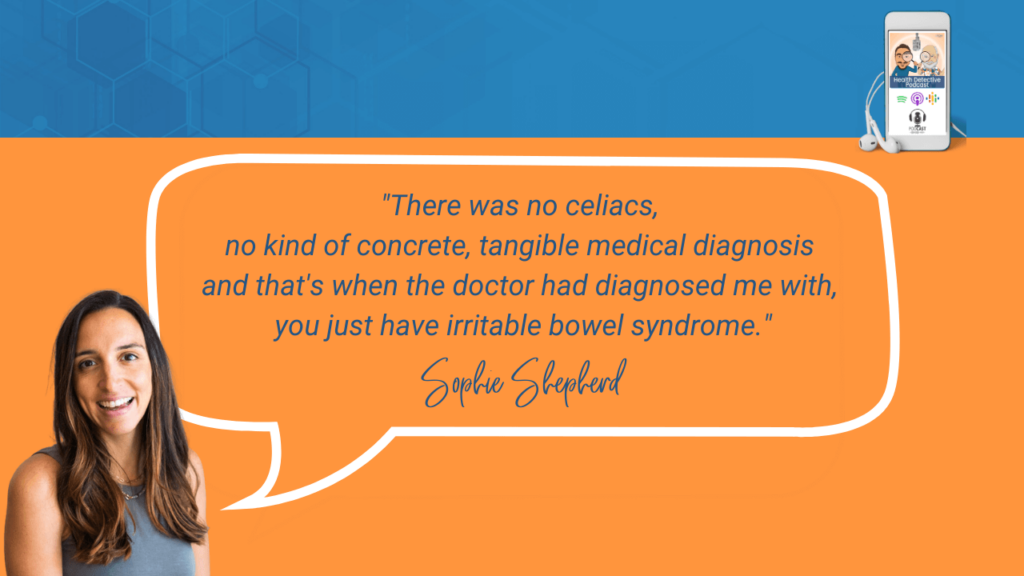
[00:05:30] Sophie Shepherd: I was young and so I accepted this diagnosis, but there was nothing. There was no IBD, colitis, or Crohn’s. There was no celiacs, no kind of concrete, tangible medical diagnosis and that’s when the doctor had diagnosed me with, you just have irritable bowel syndrome.
Is IBS Just BS: A Lot of Emotions
You’re just going to have to take Prilosec for the rest of your life, which is an acid reducer. Give up chocolate, no coffee, no tomatoes, he just listed off all the things that give me joy, crushed all my dreams, and said I couldn’t have any of those.
He did say I had a hiatal hernia, which normally you would think maybe you could have surgery. But he said, it’ll just go away on its own and you’re just going to have to deal with this pain. This is just the way your life’s going to be now.
[00:06:20] Detective Ev: Wow! So, I’m guessing that wasn’t particularly encouraging. It’s one thing to go through that and then hey, we found it. We’ll fix it. Okay. That was worth the tubes. But then no, it’s surprise, it’s nothing. That’ll be a few thousand dollars, even with good insurance, probably.
[00:06:33] Sophie Shepherd: And I didn’t really understand the cost of money for your health. But if you want to go back that far, I’m sure I’ve spent a lot of money on my health and my parents have too. We didn’t know any better. My mom didn’t know any better. We just thought, I guess that’s just the way it is.

I just had accepted that through the rest of high school, through college. It wasn’t until someone stops me. And I will say I think in a lot of ways, I have a lot of emotions tied to that doctor interaction. Because if he was able to help me, then I truly believe I would not have ended up on antidepressants or with autoimmune thyroiditis because we know that the gut is so connected, and it wasn’t just IBS.
Is IBS Just BS: No IBS Toolbox
[00:07:18] Detective Ev: I’m looking forward to diving into that. Again, especially if it’s a lay person coming on, I just want help today because if you talk to enough people, there’s going to be one person out there that this is their thing. This is the first thing they may have ever heard in the functional health space. And what a privilege, right? To get to do that for someone.
IBS, they know it as irritable bowel syndrome, right? Can we explain though, that’s not a real, like when you say, is it BS, it’s not a real diagnosis. So, for someone that doesn’t get why it’s not a real diagnosis, in a certain sense, like what does that mean? I’m hearing about this for the first time. I think I have a diagnosis, but in a sense I don’t.
[00:07:52] Sophie Shepherd: I would say it’s a diagnosis through exclusion. The good thing about our medical system is that they are looking for cancer, polyps, if you have Crohn’s, or colitis, something very serious, that could be potentially life threatening, right? That’s what they are trying to diagnose.
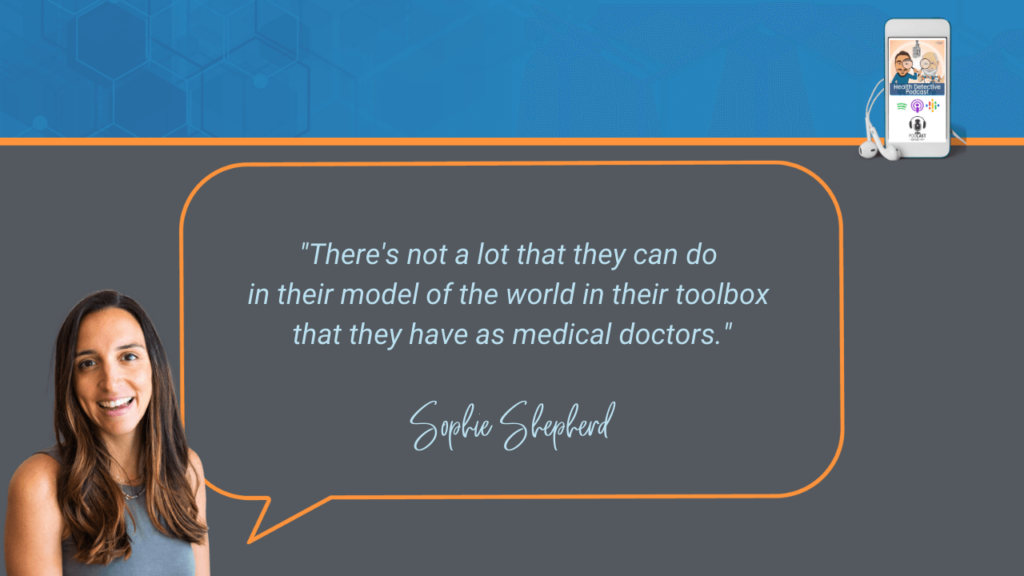
When they come back and they say IBS, it’s like, hey, you have all these symptoms, you’re running to the bathroom, you’re bloating, you have reflux, you’re in pain every day but we have no medical reason to tell you why. There’s not something you can do. It’s not caused by anything. We don’t know why you’re having these pains. And so, there’s not a lot that they can do in their model of the world in their toolbox that they have as medical doctors.
Is IBS Just BS: Gut Issues & Stress
That’s where I say it’s not a real diagnosis because there’s not a lot of steps you can do about it from their perspective. Now we know as FDNs, there’s a lot we can do. We can talk about that today too.
[00:08:42] Detective Ev: Correct me if I’m wrong, then is it fair to say an idiopathic diagnosis like IBS is done when Western medicine or I guess any medicine is noticing, hey, a bunch of people have these symptoms, but we don’t know much about it or what it’s caused by. Then we label this on. Would that be fair to say?
[00:08:57] Sophie Shepherd: I think so. And I think their hands are often tied by the studies that they need and the type of studies, the amount of studies, before they can add a new diagnosis or add a new treatment plan even. That’s how I would think of it too.
[00:09:11] Detective Ev: So, progressing further here, you found the functional medicine thing seven years later after all this started. And from the way that you said the story, I’m guessing that during those seven years, that is when the antidepressants came in and the autoimmunity. When did that start? What did that look like?
[00:09:26] Sophie Shepherd: I think anxiety and depression and the gut are super connected. We could maybe nerd out about the science there. What came first, the chicken or the egg is a conversation I always have.

And I can’t quite remember. But in my memory, I remember the gut issues and then I remember having a lot of stress about getting into college and trying to prove myself, be good enough, and excellent at everything, get A+’s and be like that.
Is IBS Just BS: Antidepressants
And then I just remember feeling like I couldn’t cope after college. I hope this is okay to talk about, but I was in an emotionally abusive relationship, my first adult relationship. That’s really where the antidepressant came in because I had no other stress coping skills.
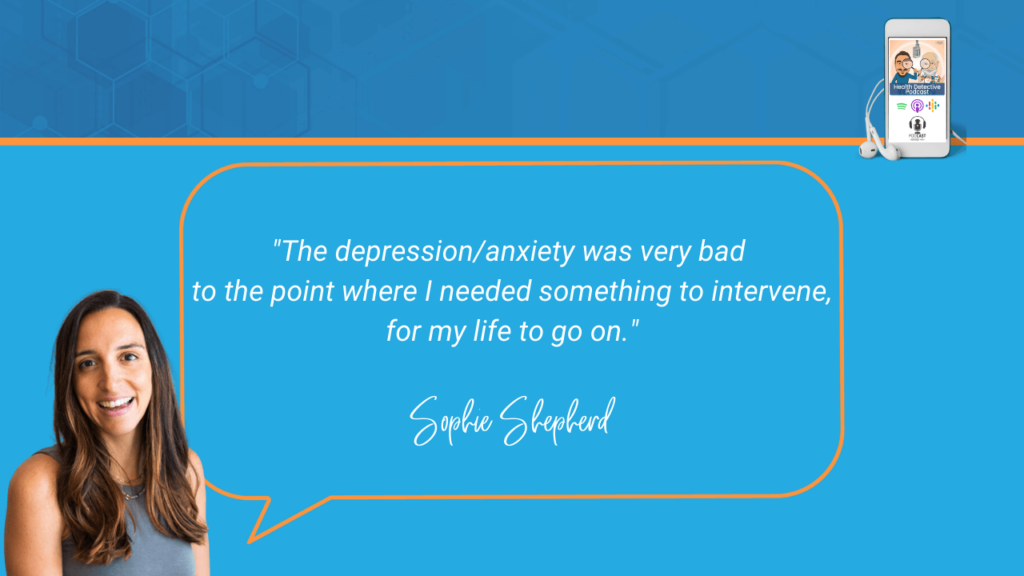
Of course, we know with FDN, it’s the DRESS protocol and one of the S’s is for stress. I had no other tools in my box. So that’s what was presented. I’m not sure how much it’s safe to share on here, but it got really bad. The depression/anxiety was very bad to the point where I needed something to intervene, for my life to go on.
[00:10:31] Detective Ev: Just so you know the conversations get as real as you’d like. And I shouldn’t even say real, that’s not a fair way to put that. It’s as transparent as you’d like it to be. Some conditions, we don’t need to talk about every little thing, but we allow anything on here. So, it’s up to you.
I’m curious then if you ended up in this obviously very negative and abusive relationship, and that seemed to precede some of the anxiety and depression stuff at one point, I don’t know if I misunderstood, you said, you believe that some of the antidepressant usage might not even have been done if the doctor recognized that to begin with. What does that mean then? If the person was abusive and that caused more of the antidepressant thing, but you also believe that if you got the proper treatment at 16 ,15, you wouldn’t have been on it. Did I understand that correctly?
Is IBS Just BS: A Box of Stress and No Lifeboat
[00:11:12] Sophie Shepherd: Yeah, I think it’s both, right?
It’s like you have genetics, right? That’s one set of things. You have maybe, predisposition for certain things. Then you have environmental or mental emotional stressors and we’re not really talking about ways to support our mental health in this country; it’s stigmatized. Then you have, in my opinion now, and knowing what I know about the gut brain connection, I had seven years of neuroinflammation.

I already had the anxiety. I had no skills to cope with it. I didn’t know about meditation or breath work or EFT or any of the things out there that I do now. Then there’s a trigger on top of that of let me put you into this box of stress and give you no lifeboat.
I think that’s where I ended up and it’s not necessarily anyone’s fault. I think it’s just the way my life happened, the series of events. And then it was like, okay, it’s to the point where I really need help here. And the help that was provided when you talk to a therapist is antidepressants.
[00:12:15] Detective Ev: This is my favorite question on the show. I’m just fascinated by these answers.
We already discussed; it was seven years. Something happened then at that seven-year mark that takes Sophie from this person who was like all of us at one point, knows nothing about this stuff, trying to figure it out, suffering with the symptoms. And then some aha moment comes where you try something new. What happened there that finally got you into this functional space?
Is IBS Just BS: The Influence of Food
[00:12:37] Sophie Shepherd: There were two things. One was I happened to be on an off-Broadway show. That’s what I used to do is theater. And my boss had three autoimmune diseases. She listened to my brain fog, my fatigue, I had gained about 30 pounds, my hair was falling out, I had anxiety, depression, and all the gut issues. And she listened to my symptoms. She said, have you heard about gluten?
I had no idea what she was talking about. So, she taught me. She was like, why don’t you just try going gluten free for 10 days to two weeks and see if it makes you feel any better? I didn’t know what that was. So, there I am in New York city, avoiding New York bagels, avoiding New York pizzas, whatever. Okay, this crazy lady thinks it’s going to help.
So, then after two weeks, I’m like, I don’t know if this is really helping, and I have pizza before the show. I am not kidding you, Evan. I fell asleep during my job, which was backstage managing a theatrical off-Broadway show.
[00:13:34] Detective Ev: Wow!
[00:13:37] Sophie Shepherd: Fell asleep, brain fog, couldn’t function. Luckily, she understood. So, she was able to step in and support me. But that was hard. Wow, I can’t do gluten ever again.
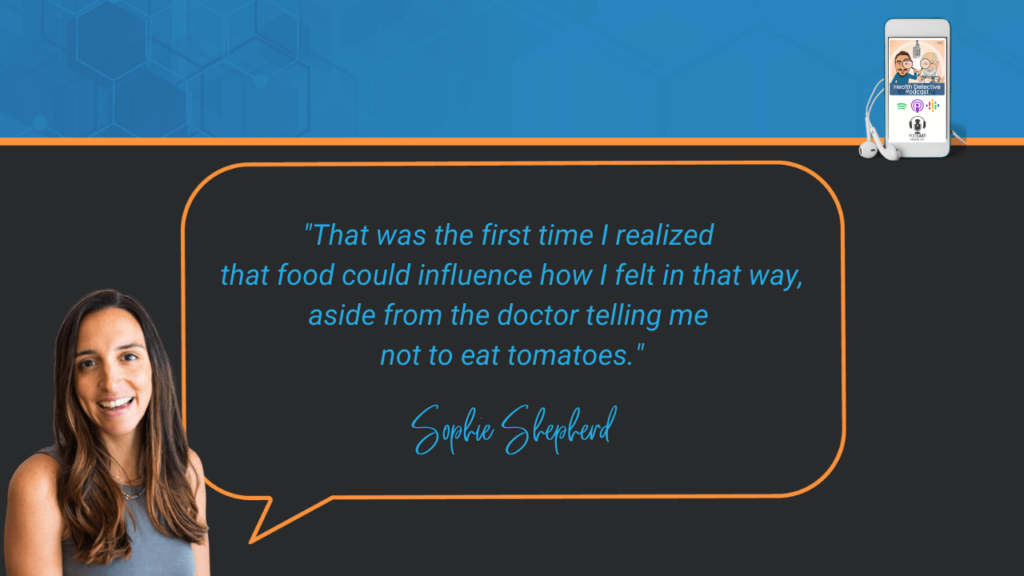
That was like, whoa, wait, something’s linked to food here and how I feel. That was the first time I realized that food could influence how I felt in that way, aside from the doctor telling me not to eat tomatoes. Then the new symptoms, the brain fog, the hair falling out, the deep depression, the exhaustion that was new from just the gut stuff.
Is IBS Just BS: Parting Ways
That’s when I went to the doctor and said, something’s wrong. I’m 22; I feel like I’m 80 years old. What’s going on here? She said I think you’re just depressed. What’s your response? I said, I didn’t realize that depression could make your hair fall out.
[00:14:26] Detective Ev: Right.
Again, someone listening maybe for the first time, we could not be less against Western medicine. We pride ourselves in that at FDN. Because we are one of the most objective places in terms of mixing the best of both worlds.
I do not need an MD to know that does not make sense. Depression does not cause hair loss. Come on.
[00:14:46] Sophie Shepherd: And I think that’s why we have integration. Because there’s certain tools that we have that Western doctors maybe don’t and vice versa. That’s why we have to have both, in my opinion, to really thrive.
Anyway, she decided reluctantly to run the labs and showed up that I had hypothyroidism. She’s like, hooray, you have a diagnosis. Here’s the medicine. And I was so excited.

Six months later, I still had the symptoms. Went back, my labs were normal. Something we hear often. She didn’t look for Hashimoto’s antibodies; she didn’t know to do that. That’s when I just ended up parting ways with that doctor and finding someone who did more root cause integrative approach.
He sat down with me for 90 minutes as I do now with all of my clients on the first call. And he listened to me. He told me that my gut was the reason I had Hashimoto’s. They talked to me about autoimmune disease and explained all the symptoms. He explained the integrative approach that we were going to take to self-treat and heal my body.
Is IBS Just BS: Another Diagnosis
[00:15:50] Detective Ev: You said something interesting that I don’t think many people can understand unless they’ve been through their own version of this stuff. Especially early 20s at the time of all things getting, hooray, I have a diagnosis. Man, that’s a unique category of people.
I’m not saying we’re victims, it’s just to explain what people go through. When you’re excited about the diagnosis, I think that’s very telling. You’re like, thank God, someone can finally tell me what’s wrong with me.
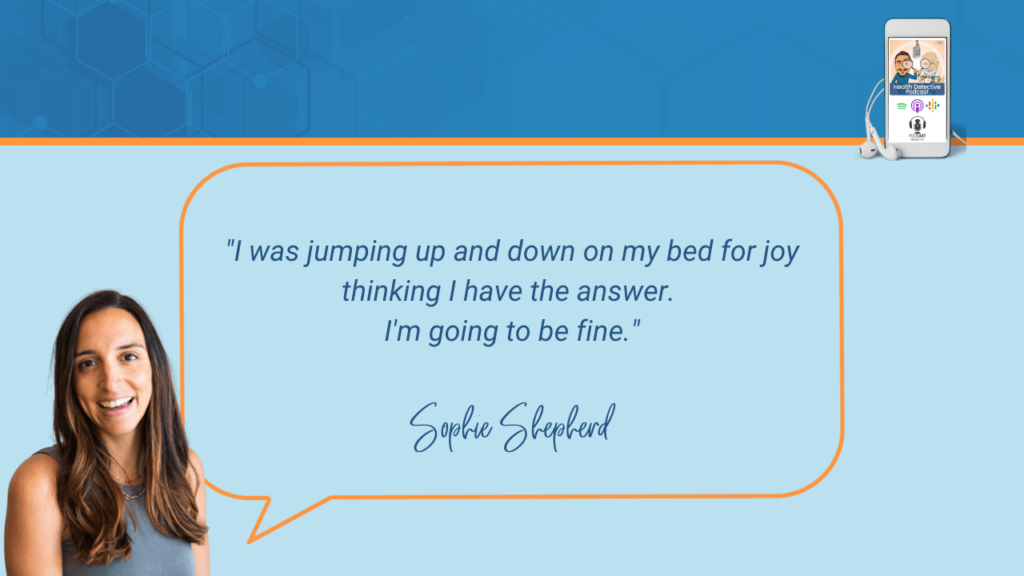
[00:16:18] Sophie Shepherd: Cause remember I had this IBS thing and there was nothing really that I could do about it. But this was like, I can take medication. I was jumping up and down on my bed for joy thinking I have the answer. I’m going to be fine. Like I tuned out the part, and you’re going to be on medication for the rest of your life.
[00:16:43] Detective Ev: Yeah. A very similar thing, not that we diagnose or treat anything at FDN, but a very similar phenomenon can happen with the labs. Even if it’s not a diagnosis when we run these labs with people, you’re showing them often for the first time what correlates with their symptoms.
We’re like, has anyone ever told you that you have this freaking parasite? Has anyone ever told you that you’ve been exposed to mold and have mycotoxins, whatever it might be? You’d think that’d be something that would scare people. But 99% of the time, it might not be jumping up and down on the bed, but there is a hooray where you’re like, thank God, someone’s telling me what I can do here so that I can go change hopefully and get better.
Is IBS Just BS: Making Things Too Complicated?
Before we talk even further about the functional medicine thing, I’m always focused on this only because I hope to do our best here at this podcast to help people make these transitions for others in their life even quicker.
So, you get the diagnosis and then you said, oh, I ended up at this more root cause integrative type of person. But Sophie, that is not something that everyone does. And obviously you’re a very intelligent person. So maybe that’s half of it, but it’s certainly not something that a young person does, right?
I think again, you’re more accepting of these things. So, were you just doing your own research? How do you go from hooray to what many people might look at as like a hippie doctor, right? That’s not your first option.
[00:17:55] Sophie Shepherd: Yeah.
So, in between the first and second running of like the six months where I started the medication and then went back with the same symptoms and thought, oh, I just need more medication. I had done a lot of research about hypothyroidism, and I’d of course found the connection to autoimmune disease, and realized that she had only run the thyroid stimulating hormone. And when I went back to the doctor, I was like, hey, I would really like you to run a full thyroid panel, including the antibodies, to see if I have an autoimmune disease.
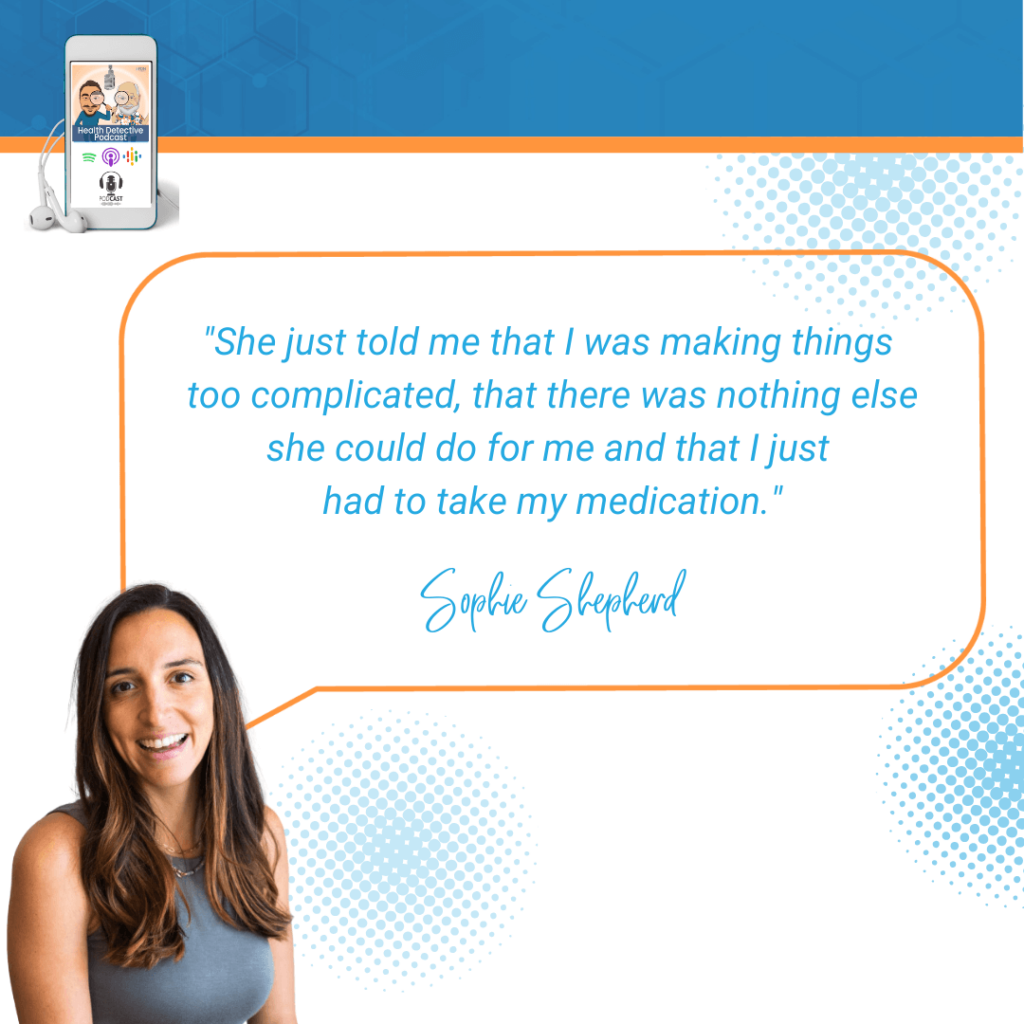
This is probably not the best reflection of this doctor, but it is the truth. She just told me that I was making things too complicated, that there was nothing else she could do for me and that I just had to take my medication.
Is IBS Just BS: Lucky Chance Happenings
Basically, I did fire her because I was like, I don’t feel well, and this doesn’t make sense. Like I shouldn’t feel this way. And I think maybe because I was young, I was like, I have so much more life to live. This can’t be it.
Then I think I just got lucky because on another show, in that year, I met somebody who had worked with a functional medicine doctor, and that was the referral. She said you really gotta go all the way up to 181st Street, go see Dr. G, he’s going to help you, I promise.
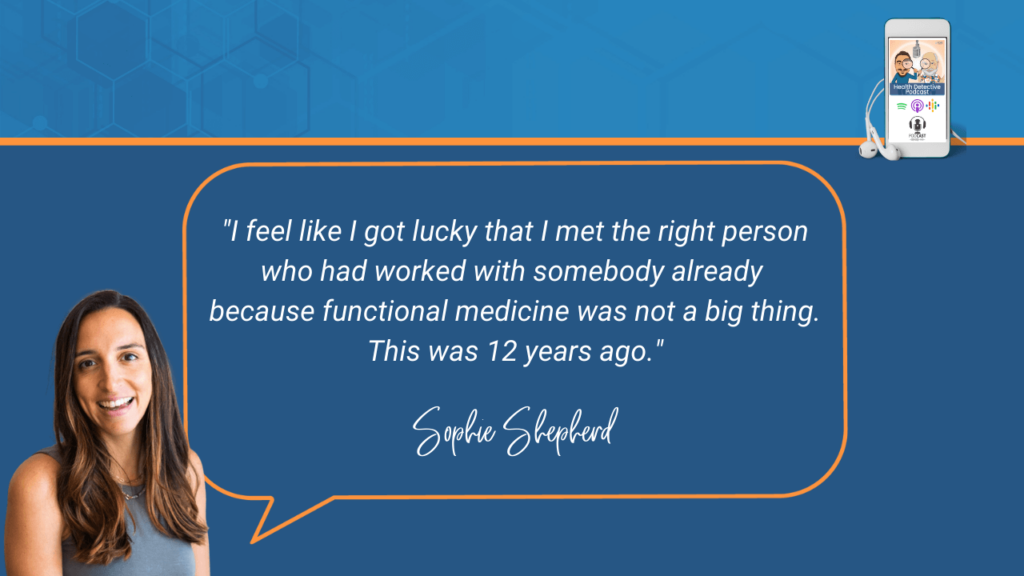
I went, and yeah, he was the first person to really understand, hear, and seem to have a comprehensive approach that it was just a no brainer for me at that moment. I feel like I got lucky that I met the right person who had worked with somebody already because functional medicine was not a big thing. This was 12 years ago.
[00:19:25] Detective Ev: Correct. And it’s still amazing how many people to this day, we live in our bubbles. I do acknowledge that the bubble is expanding, but there are so many people who have no idea what the heck we’re talking about. And it’s really their first introduction.
I appreciate what you said about luck. That’s one of the reasons I think many of us, in a sense, feel obligated in a positive way to go do these careers that we have. When this happens to you, you realize if these chance happenings didn’t occur the way that they did, let’s say that person never told you to go off gluten. How much longer do you think you would have been going through this before ever figuring something out, if ever? It’s crazy.
Is IBS Just BS: No More Settling
[00:20:01] Sophie Shepherd: I support women with hypothyroidism amongst many other things, all these symptoms that we have, and they have gotten the diagnosis from their doctor. We support through the DRESS model of diet, rest, exercise, stress reduction, and supplementation and, of course, the functional labs.
I can’t tell you how many clients I have who waited 20 years. And I don’t mean that’s on them. They didn’t know, they didn’t get lucky. So, it takes much longer for them to get to feel better too, when you’re in that spot.
I just feel so grateful for those people in my life. They were pivotal to my transformation and my health.
[00:20:39] Detective Ev: That’s why I appreciate the explanation because listen everyone’s different with their interests and stuff. No, not everyone’s going to be like us and sit at home and research these things.
But something that they can take is having the courage to do what you said jokingly, but also literally, no, you’re fired. Not because I’m arrogant and acting like I know more than you. You’re not doing that. You knew it wasn’t working. You knew you didn’t feel well. That’s called having confidence to say, I need to go try something different. That’s not arrogance. That’s confidence.
[00:21:06] Sophie Shepherd: And self-worth.

A lot of that, just linking it back to the emotional abuse, like all of my self-confidence had been stripped away by this relationship. And when I got out of it, I realized through my parents, through my friends that I was worthwhile and that I deserved happiness and health. So, I was not going to settle for I don’t knows and I have nothing else to offer you. That was just not an option for me anymore.
Is IBS Just BS: The Herbicide Company
[00:21:32] Detective Ev: Sophie, best part of the story, probably when did you decide that this is what you want to be when you grow up?
Again, tons of people go through this. You might’ve worked with the doctor, and you feel better. And then you still go back to whatever you were pursuing before. But you said, no. This is life now. And my gosh, I’ve seen you in FDN as long as I’ve been here, I think. I’m not sure when you graduated, but you’ve been around the block with this is your thing.
So, when did you decide this is what you want to be when you grow up?
[00:21:54] Sophie Shepherd: I have a really good story for you guys. And you might have to ask some follow up questions because there might be some words I use that are strange if someone’s never heard this before.
After theater, I decided to go into events. It’s ironic cause I’m at a hotel right now because my husband now is in events and I’m actually helping him out tonight, which is so weird. Cause I’m an FDN, but I’m helping.
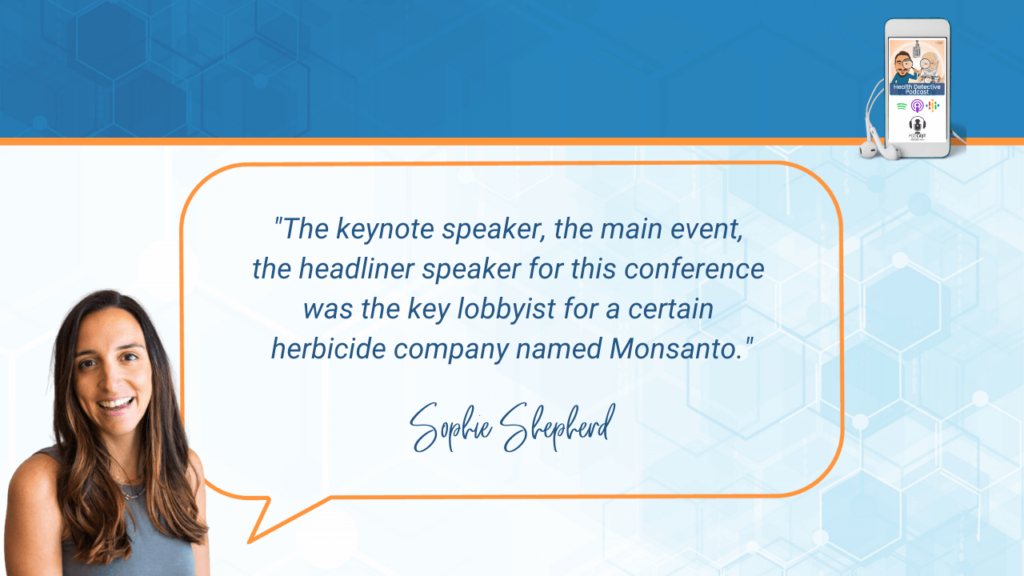
Anyway, I did events, and I was at an event for some conventional farmers, thousands of our nation’s farmers. The keynote speaker, the main event, the headliner speaker for this conference was the key lobbyist for a certain herbicide company named Monsanto.
Remember I was in theater, my job was to help the speakers, the people that were presenting, get their coffee, get their presentations ready, make sure that they were safe on stage, all that stuff. He was literally my responsibility.
Is IBS Just BS: Walking Off
So, there I am in the back of this auditorium having just recovered my health through this functional medicine doctor that I had worked with and a big part of it was food and organic food and fresh food and no antibiotics and all the things, right?

And he’s standing up there. There are boxes of herbicides in the middle of all of the tables in front of all of these thousands of farmers. And he’s telling them that this herbicide doesn’t do damage, that organic food isn’t better for us, all this stuff. And I literally turned to my boss and said, I can’t be in this room. I literally walked off.
I went and I bought, this was my IIN, I did IIN before FDN, I bought my IIN health coaching certification on a credit card. So, I had no money, I just did it. I was like, I can’t. This is not in my value system anymore. I went through that while working as an event planner for the next year. Quit, had no idea what I was doing.
And then about a year after that found FDN. Because as a health coach, I was working on things without the lab support, and I was finding that 80 percent of my clients would get better, of course, because of nutrition and rest and exercise and stress reduction. But getting specific about the supplements based off of understanding more about them through the labs seemed like a really good approach, because that’s what my person had done for me.
So that’s where I got FDN. And then I just haven’t really looked back.
Is IBS Just BS: Successfully Sued
[00:24:26] Detective Ev: What a heck of a coincidence. Again, this is why these stories are amazing sometimes. You talk about luck or unluckiness, depending on how you look at it, but what are the odds that you end up being this person?
You know what, the following statements are not on behalf of FDN, they are on behalf of Evan Transue. And you can happily sue me for this. Some of the scummiest of the scum, man, absolute BS, and that’s proven. That’s not an opinion because we know that they’ve had ghostwriters for studies. They’ve been successfully sued for that. Look up Stanford Monsanto scientists. They actually paid off a scientist to ghostwrite studies to get their stuff on the market. Successfully sued.
That’s not an opinion, that’s not slander. It’s a fact. Not to mention the beginning stuff that happened with GMOs when they first came out with that in Europe. Holy crap. Then how is this still allowed to operate? We have glyphosate now.
[00:25:17] Sophie Shepherd: It’s in our rainwater.
[00:25:19] Detective Ev: If you and I made a supplement line and that supplement line caused non-Hodgkin’s lymphoma and all the other crap that it’s doing, we’d have to shut down tomorrow. Instead, they get favored treatment and say, you guys just have to remove it a little bit over the next several years. And I think it’s still going to be used commercially. This is insane.
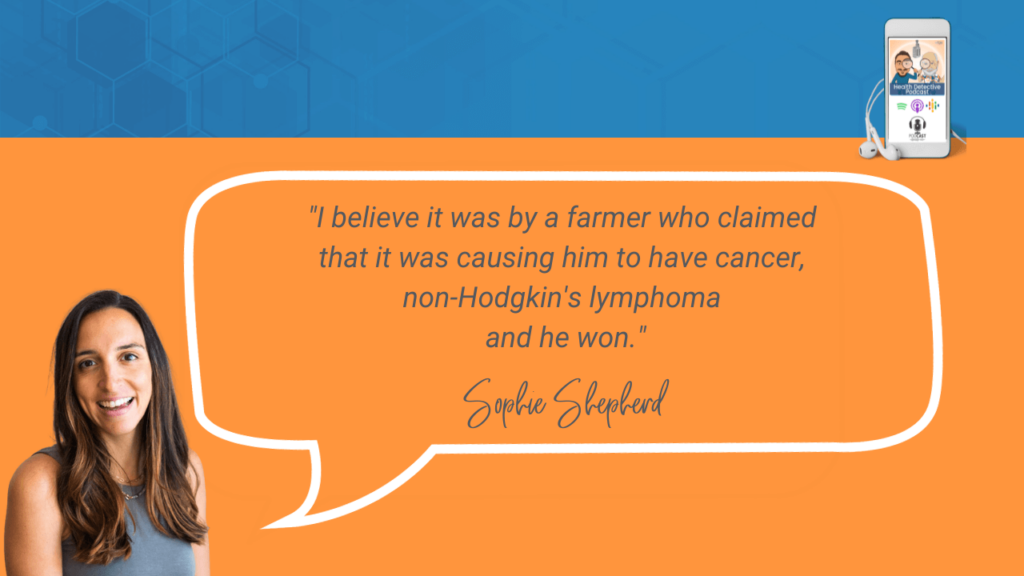
[00:25:39] Sophie Shepherd: It’s so sad. Unbelievable. And that’s the other thing. A couple of years ago, they got sued. I believe it was by a farmer who claimed that it was causing him to have cancer, non-Hodgkin’s lymphoma and he won.
Is IBS Just BS: Taking a Stand
[00:25:55] Detective Ev: Yes. That set the precedent.
Sorry, not that it’s the main topic, but you got me going because GMOs are the first thing I learned about health. It was at 16, making some questionable decisions at that time. But I was learning, starting to plant the seeds.
The farmer did sue. And now they’ve been successfully sued for, might be over a billion now, hundreds of millions of dollars. That was the precedent for this. So, we know it does this.
And if I tested every single person watching this right now via urine, assuming you live even remotely local to other people in America, you have some level of this in your urine right now. So do I, so does Sophie. And yes, we all eat well. We try our best.
They have destroyed the environment. It’s insane. And then, oh slap on the wrist. Just start taking that off the market over the next several years. But you guys can keep doing it. Cause you’re a big company. I’ll stop, but that one gets me. It is so blatantly wrong what happens. And you know what, Sophie, the average person has no idea.
[00:26:50] Sophie Shepherd: They don’t. And now you can see why I literally did the most unprofessional thing that I’ve ever done. I was just like; this does not align with my values. This feels so wrong on so many levels. And I just couldn’t do it anymore.
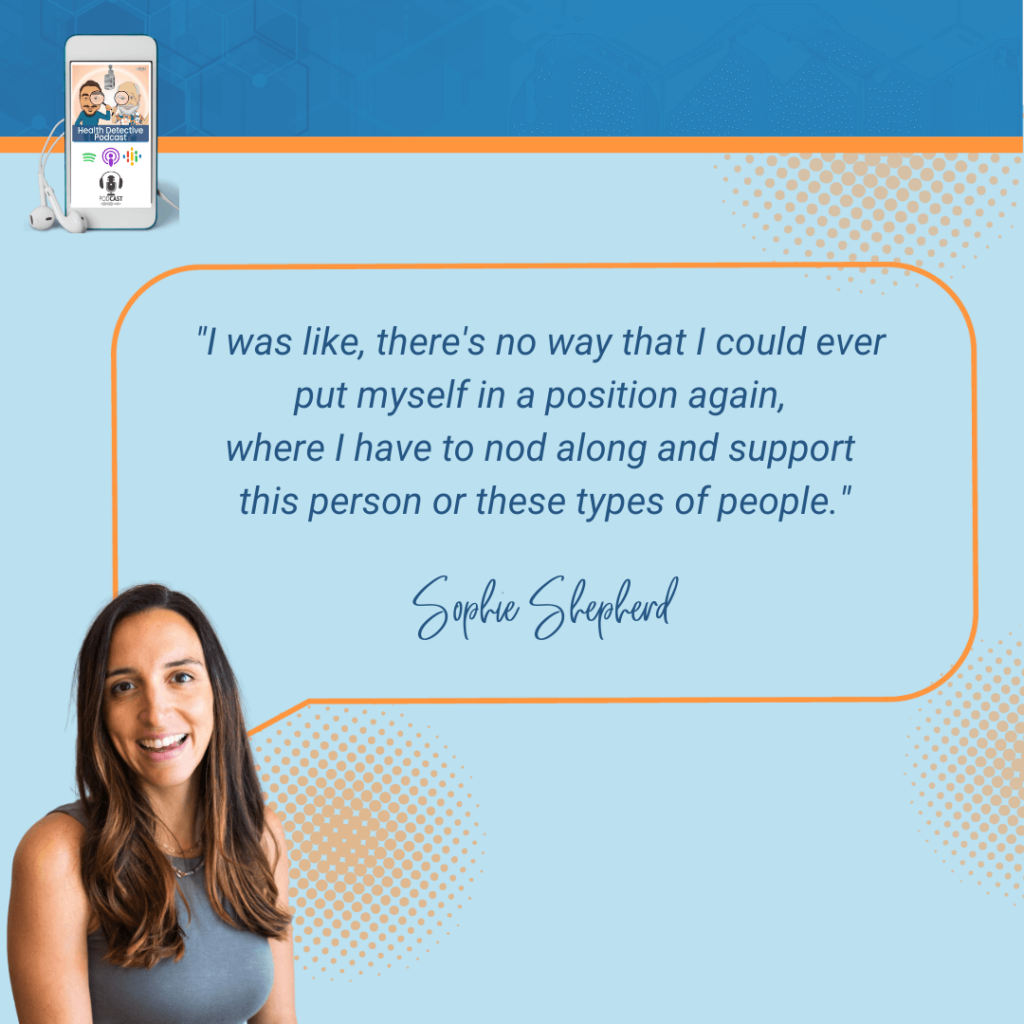
I was like, there’s no way that I could ever put myself in a position again, where I have to nod along and support this person or these types of people. I just can’t do it. So, I was like, I’m going to choose a different path.
Is IBS Just BS: A Pattern of Dysbiosis
[00:27:14] Detective Ev: Yeah, you certainly did flip that abusive relationship upside down. Because what you did with the doctor and what you did there, not everyone has that. And I encourage everyone to have that after this and something like this. It’s standing up for what’s right. Having the confidence in yourself. If we all just apply that, I think we solve 50 percent of this mess tomorrow. The other 50 percent can be solved by the functional work, right?
So as someone who, again, you work with a variety of people, you talked about how you help them with thyroid stuff as well, but I’m curious specifically with the IBS. Yes, there’s no known causal stuff in the world of Western medicine. Which certainly as a well-versed practitioner, you’ve seen some things on labs that might come up consistently with people who have IBS.
What are some of the things that you found in your practice over these years of working as an FDN? What’s coming up that maybe these people commonly deal with?
[00:28:02] Sophie Shepherd: One of the foundational, I think it’s a foundational lab now. I went through FDN a long time ago, but I know that they teach the GI MAP now. And that’s one of the foundational labs that we can access for our clients and see if they want to self-test themselves to see what’s going on in their gut.
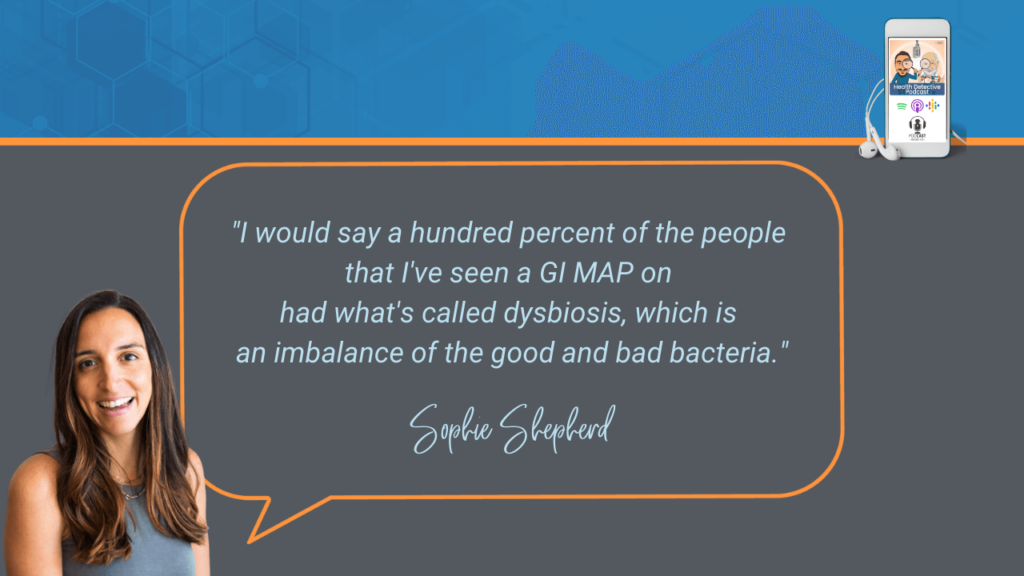
What I’ve seen in their gut is a few things actually. I would say a hundred percent of the people that I’ve seen a GI MAP on had what’s called dysbiosis, which is an imbalance of the good and bad bacteria.
Is IBS Just BS: Eradicating Overgrowths
We have an overgrowth of this opportunistic, inflammatory bacteria and not enough of the good stuff that protects our lining in our gut, protects us and helps us to create nutrients like vitamin K and B vitamins in our gut. How cool is this, by the way, that our bacteria do this? I had no idea back when I was like, what’s gluten?
So, there’s like the dysbiosis, this overgrowth. There’s, I would say maybe 30 percent of the time we see a parasite. Which people think, oh, I have to go to a foreign country to get a parasite. Absolutely not true. We have them in our water; we have them in our food.
And really, we teach in FDN it’s what’s going on with the host? What’s going on with us? How is our stress? How is our immune system functioning that might allow for these bacteria and parasites and things to come in?
We know parasites eat our food. They cause inflammation. They just wreak havoc, right? And a lot of them have been associated with the symptoms of bloating and diarrhea, things like this. Bacteria have been associated with constipation, diarrhea, all these symptoms. The symptoms that are labeled as IBS.
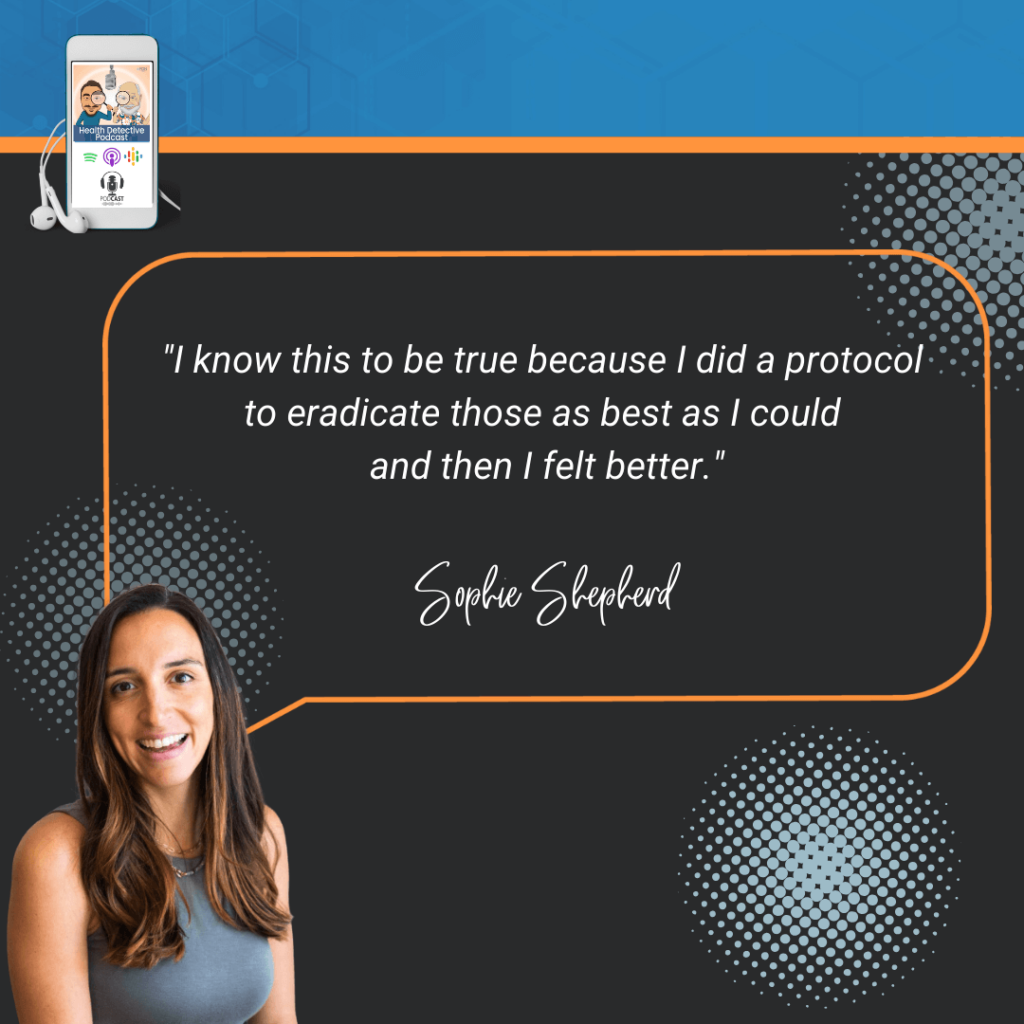
A lot of people have H. pylori, a lot of people have yeast overgrowth. So, all these different things that can grow in our gut that we’re testing through stool have the same symptoms as IBS. So, it’s my belief through my own experience of my body that when my doctor diagnosed me with IBS, I had overgrowths. I know this to be true because I did a protocol to eradicate those as best as I could and then I felt better.
Is IBS Just BS: Leaky Gut
And then the other part of it is the leaky gut conversation, which is, of course, the lining of our gut being one cell thick as our founder Reed Davis always taught us. There’s a mucus layer that protects us from the onslaught of these bacteria, these parasites, gluten, glyphosate, which is that herbicide that is in Roundup Ready, all these things coming into our environment every day. We have a protective mechanism there.
But over time, stress, alcohol, gluten, glyphosate, parasites, they break down our barriers, right? And that’s where we see this then moving into the gut and then the brain connection or inflammation elsewhere in the body, autoimmune disease connection to the gut. That’s where I really feel like the IBS is coming from is potentially that, plus the emotional stressors. Because, of course, we know if we are stressed up here, a lot of people will feel it down in the gut.
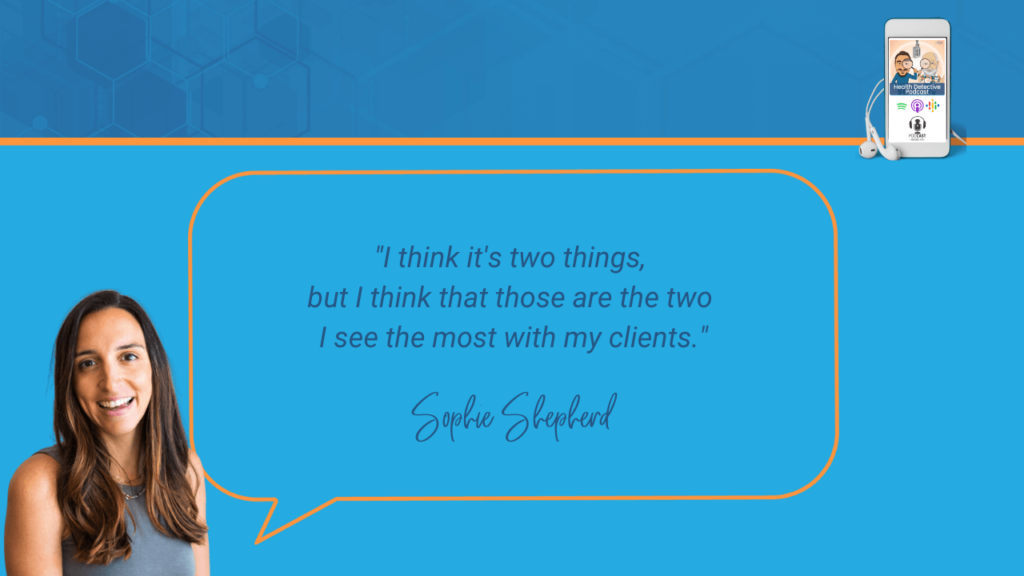
So, I think it’s two things, but I think that those are the two I see the most with my clients.
[00:31:07] Detective Ev: Yeah. There really seems to be this bidirectional or even synergistic relationship between what’s going on up here, for those on audio, I’m pointing to like the brain and mind, and then what’s in the gut.
In fact, this might not be up to date, this is several years ago. But I had read something that said there’s a 40 percent comorbidity rate of anxiety and depression with those who have IBS or have been given a diagnosis labeled as IBS. Which is crazy because you have to sit there and wonder, that’s so overrepresented.
Is IBS Just BS: NLP, Anti-Inflammatory Supplements, and Gut Work
Of course, it can go both ways because we know if you’re in constant fight or flight, which could easily happen with an anxiety condition, one of the things that shuts down first, not literally, but is your digestion. Because your body is saying we’re in fight or flight. We need to protect you; we definitely don’t need to digest this food this one time to save our lives. But it isn’t one time, is it? It turns out being a chronic thing.
[00:31:56] Sophie Shepherd: Especially these days. Everyone’s just in fight or flight, I think, like all the time.
[00:32:00] Detective Ev: Yeah. And then you brought up one of my favorite topics. You already had mentioned before this whole neuro inflammation thing and it leading to anxiety, depression or other things.
For those that might be unfamiliar or still stuck on (and I do think there’s validity to this, by the way, I just don’t think it’s complete), for those stuck on the idea that wait, no, depression is a lack of serotonin, right? Or there’s something wrong with my GABA and I need Xanax if it’s anxiety. What’s going on with that neuro inflammation aspect there that’s leading to the mental health symptoms?
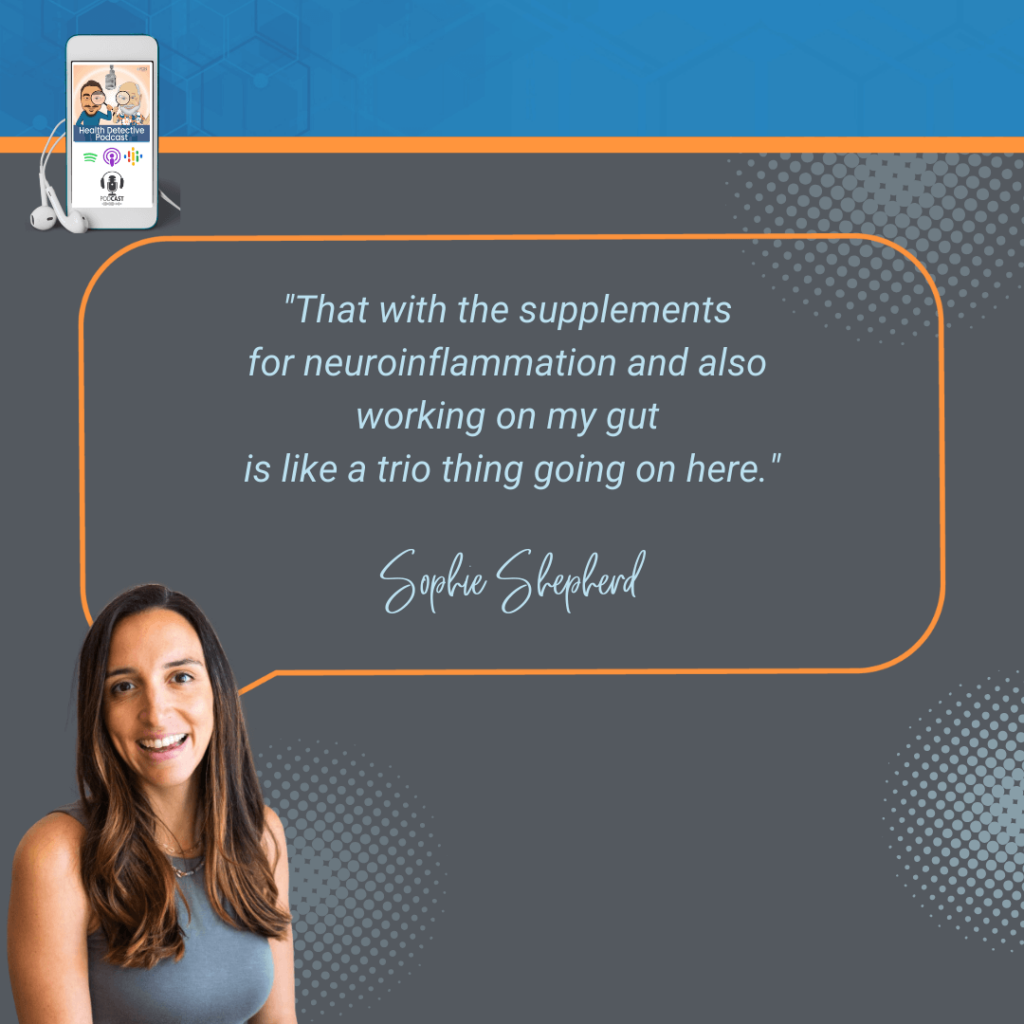
[00:32:27] Sophie Shepherd: It’s Interesting. I’ve also, by the way, transitioned myself off my antidepressants 10 years later. About a year and a half ago, I was able to do this with a combination of the, when you introduced me the NLP life coaching, which I would love to just mention as part of this, because that’s a big part of the stress component. That with the supplements for neuroinflammation and also working on my gut is like a trio thing going on here.
Is IBS Just BS: Holistic Support
When you think about neuroinflammation, we think about neurodivergence, we think about ADHD, we think about depression, fatigue, brain fog. There is a lot of conversations about this idea of leaky gut, leaky brain, right?
The idea that if we only have one cell membrane, basically, keeping us from the outside world meaning the water, the soil, the foods, like all that’s coming in, then that is gone, we have established there’s leaky gut. And now those toxins, those food particles are hitting our immune system and our bloodstream. Our bloodstream could go anywhere. And maybe depending on your genetics or depending on your luck, it goes to your brain, right?
And so, we see this high correlation of people dealing with mental health issues and IBS because we know it’s connected through the vagus nerve. We know it’s connected to the microbes, that they’re communicating. And we know that inflammation can leave the gut and travel elsewhere, including the brain.
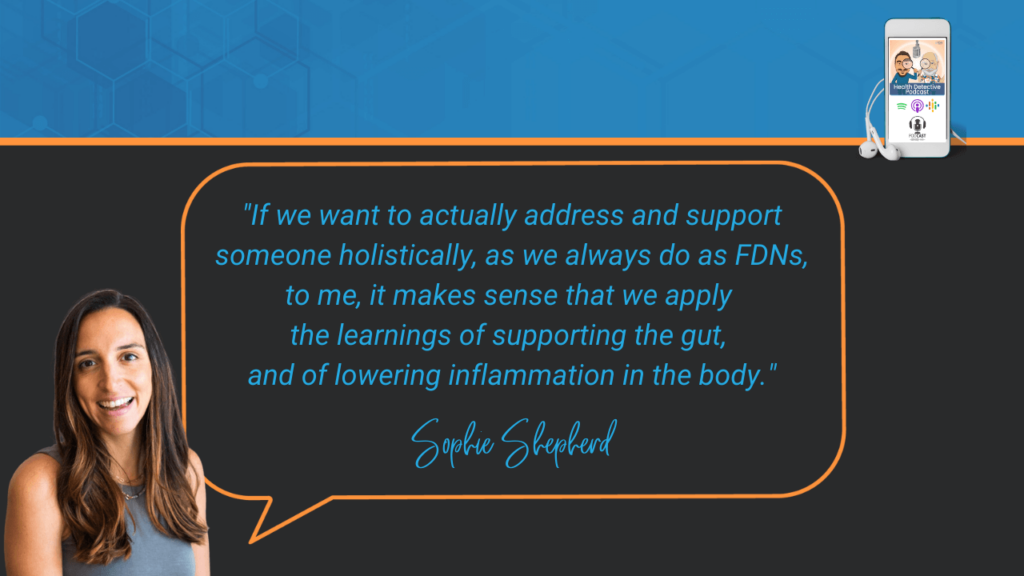
How does that manifest? It can manifest as anxiety and depression, that neural inflammation. And so, if we want to actually address and support someone holistically, as we always do as FDNs, to me, it makes sense that we apply the learnings of supporting the gut, and of lowering inflammation in the body.
So, we do all those things, but we also support that S in the DRESS foundations. And that is really important so that it can stop sending this biofeedback of negativity to itself.
[00:34:26] Detective Ev: I’m a broken record with this study. So, apologies to anyone who actually might listen regularly. But I think everyone needs to know this because this proves the point of what you just said.
Is IBS Just BS: The Meta-Analysis
There was this meta-analysis done, I think it was in 2017 or something. I only looked this up because I kept hearing anxiety/depression is neuroinflammation, or it can be, right? And I had been anxious my entire life. So, I figured, okay, if it’s inflammation, then shouldn’t things like anti-inflammatory drugs temporarily help?
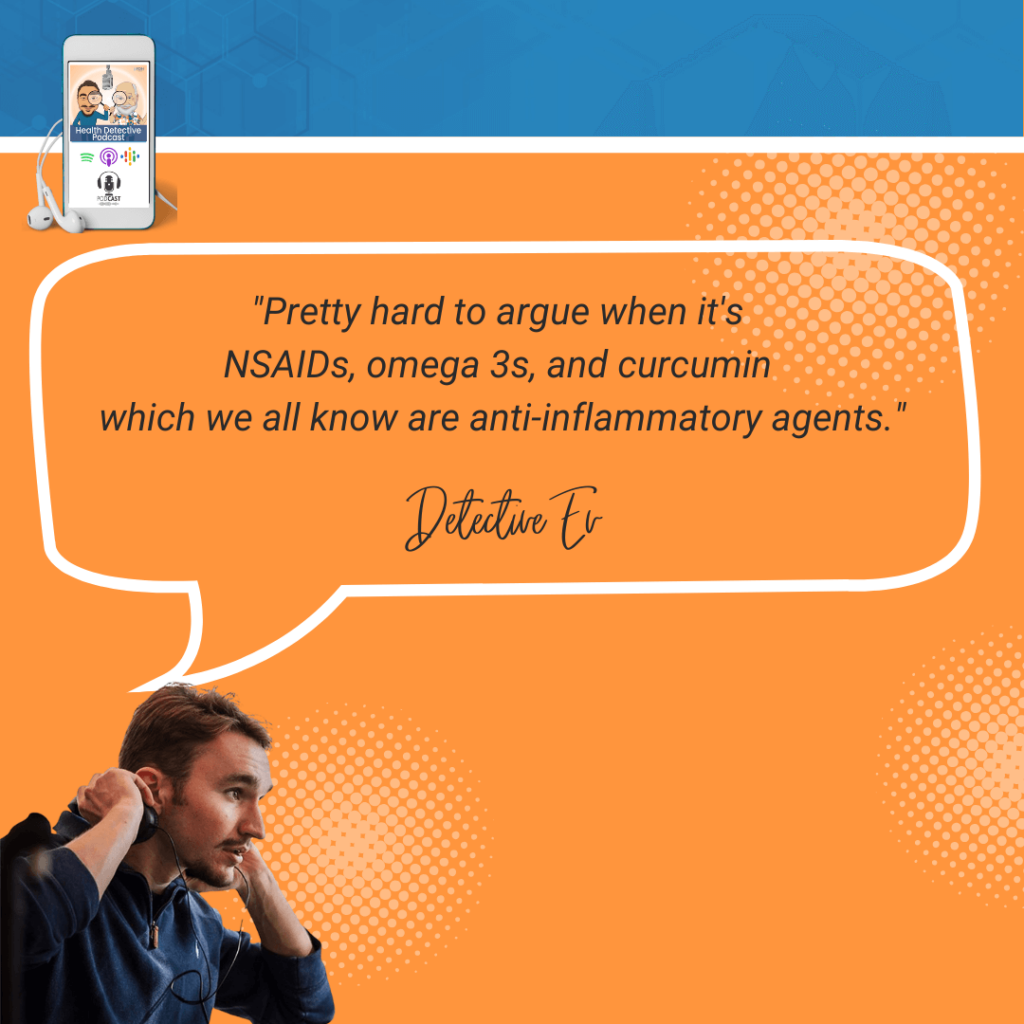
The meta-analysis also looked at curcumin, which is in turmeric. It looked at omega 3s, which I thought they must be someone like us. It was particularly astute to do that because, of course, Western medicine, the first thing they’re going to say is, oh, it’s just a random side effect that we don’t know about; that’s why NSAIDs lead to that. Pretty hard to argue when it’s NSAIDs, omega 3s, and curcumin which we all know are anti-inflammatory agents.
I don’t think that’s just a side effect. I think lowering that inflammation actually helps these symptoms, which is fascinating. Because we all know that as much as we try, Sophie, we’re still walking around mildly inflamed because of the things that are happening, like our wonderful friends at Monsanto, who’s now under Bayer for those that don’t know, the pharmaceutical company.
Sophie Shepherd: Which is not terrifying at all.
Detective Ev: You can’t make this stuff up. You literally couldn’t make it up. Why they would want to buy them if they rely on people taking pharmaceuticals. But yeah.
[00:35:57] Sophie Shepherd: Yep, I am with you. I was actually at an event when I learned that because I was like, wow, that is insane.
Is IBS Just BS: Lifestyle Changes
I won’t name the name because I do respect this company, but I was at a gut health thing a couple Fridays ago with a few other FDNs. They were pushing and pushing the supplements, pushing the curcumin, the omega 3, and the probiotics. I’m like, that’s all great. But we have to deal with the thoughts, emotions, and beliefs that are up here that are causing us to feel not worthy, stressed out, perfectionist, like we have to deal with the stress.
That’s one of the reasons I love FDN so much is because it’s more holistic. We can’t just supplement our way through inflammation in the body. We actually have to address, why do I have the inflammation?
[00:36:49] Detective Ev: Yeah, thank you, because I get lost in these and I’m really enjoying this conversation. Then I forget.
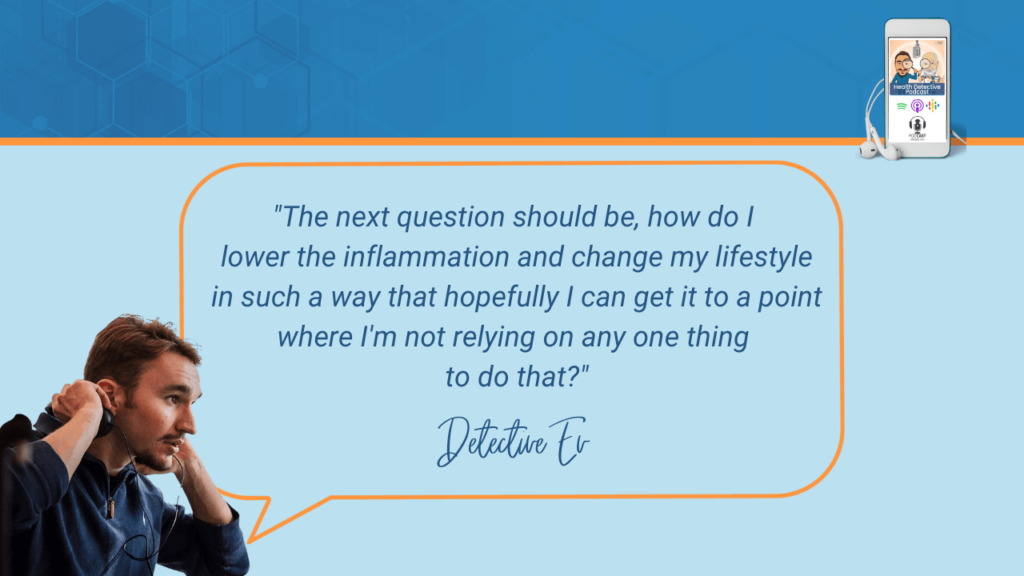
Yeah. If someone, my gosh, if they just heard that for the first time, they’re like, oh, I’ll go take an Advil for my fricking anxiety or depression. Either way, this is not medical advice, but no, that’s not what we’re saying. What we’re saying is those things work indicating an inflammatory aspect here. The next question should be, how do I lower the inflammation and change my lifestyle in such a way that hopefully I can get it to a point where I’m not relying on any one thing to do that? Excellent point.
We only have about 10 minutes left but no rush. I just wanted to make sure we truly highlight what you’re doing nowadays. You’ve been doing this whole functional coaching thing for quite some time. So, who is your favorite type of client to work with? Not even just conditions, like the personality behind them.
Is IBS Just BS: Sophie’s Ideal Client
Because I want someone that resonates with you not random people reaching out. I want your dream client and I want you to be their dream practitioner. So, who’s the typical type of person that you like to work with? And what can they expect if they give you guys a call?
Sophie Shepherd: There’s two. The first one is someone who is newer to this, who maybe hasn’t ever experienced this and really does need the foundations – the diet, the lifestyle, the stress reduction, the supplementation. And they’re willing to invest in their health and want to run those labs and want to take some advice, do their own research and decide if it’s for them, someone who’s going to be interactive with me.
[00:38:11] Sophie Shepherd: We are not doctors. We’re not dictating to you. We are sharing information and suggesting things that could be helpful for you. And then having that relationship and that partnership in your health is really important to me.
The addition to that, as in my bio, I also do the NLP subconscious mindset stuff. That’s really been a huge part of my journey, like I mentioned getting off antidepressants, like the mental health part of things. After all, we know stress is at the root of everything, whether it’s physical stress, chemical stress, or emotional stress.

So, I really, now I do this merger of helping people with their emotional stress and the physical stuff that we’ve learned through FDN. And so, my dream is a woman who wants to go all in and wants to address the fact that they might have some emotions that are stuck or have some patterns in their belief system.
Is IBS Just BS: Sophie’s Protocols
By the way, I’m not talking about religious belief systems, but I’m talking about things like, I’m not worthy, like that belief. That’s holding them back, causing them anxiety and depression or things like that. Someone who’s really willing to work with me as their partner and their health on the mental/emotional level and the physical level.
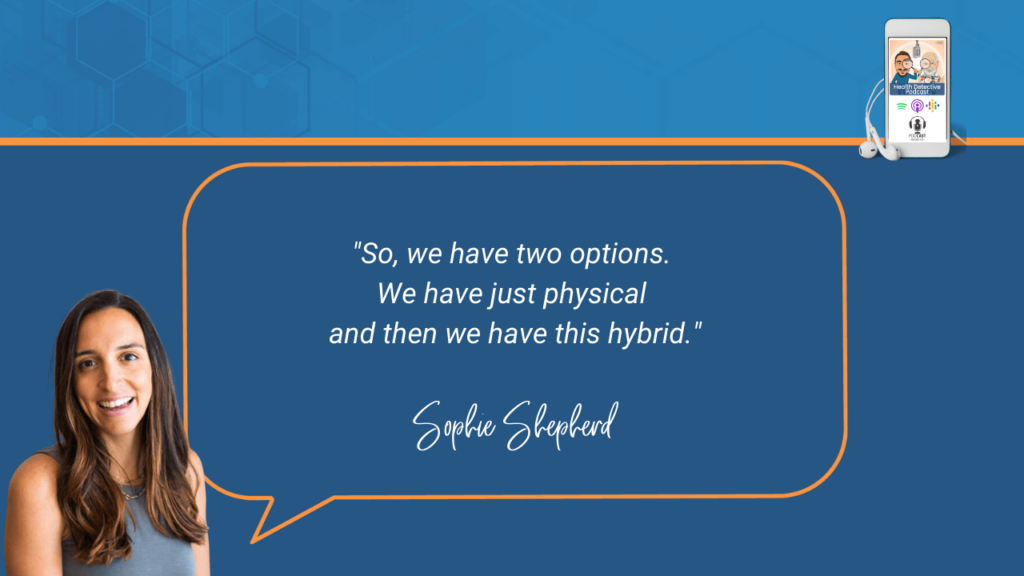
So, we have two options. We have just physical and then we have this hybrid. But what I’m finding is that if we can do that hybrid, people have not just health changes, but full life changes. Their parenting gets better, their kids are happier, their marriage is better. They are going for the dream job. I have full body chills thinking about it right now. That’s where I’m at now six years into the practice.
[00:39:52] Detective Ev: And it’s amazing!
I love what you had just said about how the other areas of your life change. I always say this because I experienced it myself and every person who comes on this podcast that is on, I won’t say the other side as if it’s a destination that you reach because it’s a constant work in progress, you’re over the hump, you’re over the initial hump. You know what to do. This is a personal development journey with health as their vehicle, right?
[00:40:14] Sophie Shepherd: Yes, it is! Especially that and then owning your own business.
[00:40:17] Detective Ev: If you really want to test it out, go do both of those.
Is IBS Just BS: Coaching People Up
[00:40:20] Sophie Shepherd: You’re right though. Because think about it. When I was 22 and I found this functional medicine doctor, he was like, okay, you have to change your entire diet. You have to take 10 supplements. I would suggest you get off birth control.
Now he was a doctor, so he could advise on that. But there were some major things that he was telling me to do. I didn’t even know what gluten was two months earlier. My parents looked at me like I had eight heads. They were supportive, but they were like, what is all this food you’re bringing into the house? And, I’ve never seen these many vegetables.
As a coach now, I see this is where there’s that intersection. Because if we don’t have boundaries and we can’t stand up for ourselves, can’t claim what’s rightfully ours in our health, that’s the personal development part of this. This is the difference between FDNs and a functional medicine doctor. No disrespect to my doctor, but I went through that journey alone. He told me what to do on a piece of paper and then I walked out of his office with instructions, and I did it myself.
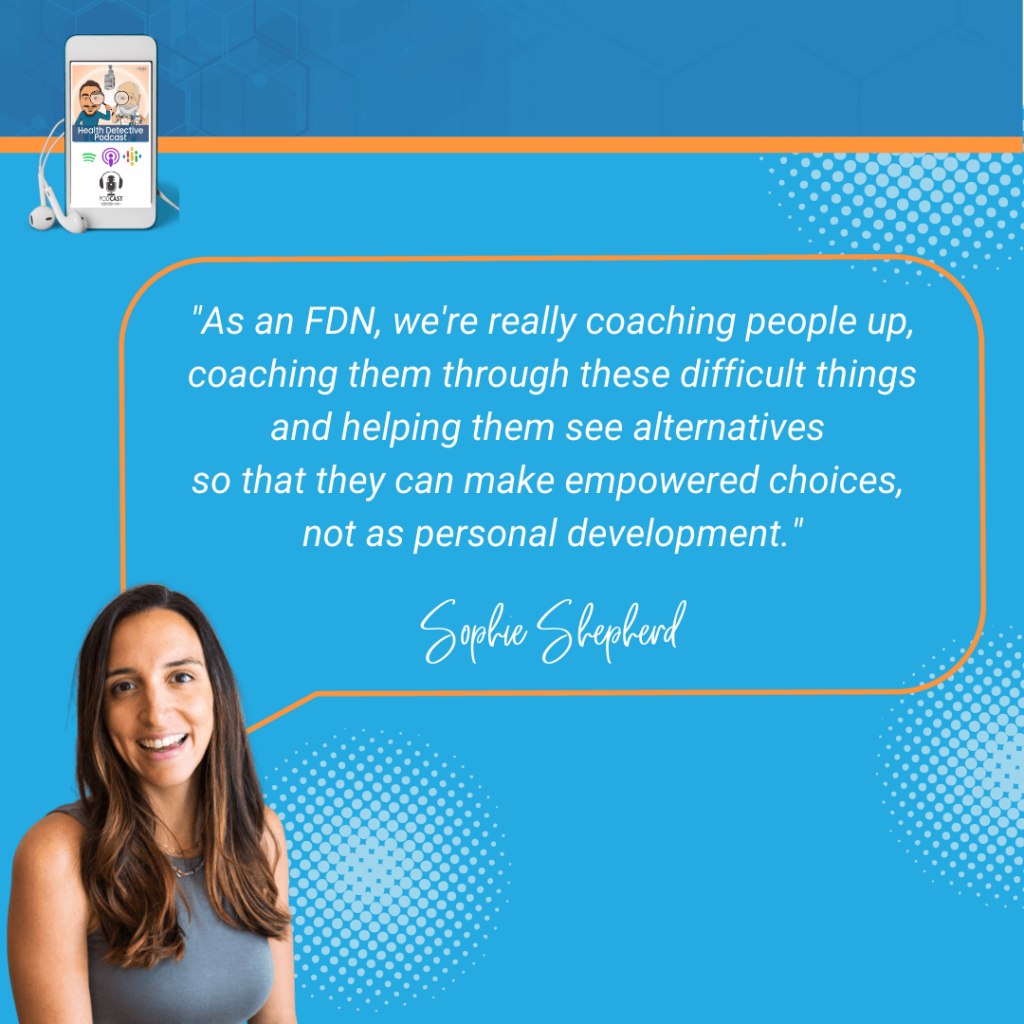
As an FDN, we’re really coaching people up, coaching them through these difficult things and helping them see alternatives so that they can make empowered choices, not as personal development. There’s a lot of transformation that’s possible.
[00:41:28] Detective Ev: Yeah.
Sophie no rush on this, I’m just curious though. I always like to highlight this, especially when someone’s been working with people for a while. To the degree that you’re able to share because I know privacy and stuff, but are there any particular one or two client testimonials that stick out?
Is IBS Just BS: Client Success Story
I’m interested in stories of someone that’s at the end of the rope coming to someone like us. Then we get the blessing of being the ones that are able to help them. Is there anyone that sticks out as just a favorite client testimonial from working with you?
[00:41:53] Sophie Shepherd: My favorite client testimonial is Erica, and she knows this. She came in, she was just like me, all the same symptoms I explained on the podcast, including Hashimoto’s. She’s 24, 25, just exhausted. And she was a scientist, so she didn’t understand why this was happening to her.
We worked together for a year. She ended up having mold, mycotoxins, parasites, mineral imbalances, hormonal imbalances, inflammation, leaky gut, dysbiosis. Everything that we learned, she had going on.
We supported through an anti-inflammatory diet, supplements that would be specific based off of suggestions from the labs to lower down the metabolic chaos and supported with minerals and nutrition.
Then we worked on her mindset cause that’s the other part of my practice now. We worked on boundaries and on speaking her truth and all these things. Her antibodies were so high that the test couldn’t measure them for her thyroid. That’s when she came in.
She dropped her antibodies by 600 points working with us. Her hair is long, down past her breast. She has long fingernails. Her cycle used to take her out every single month, she would have to call out of work. Perfect cycles, no pain. She has clear skin, lost 35 pounds, and has so much energy that she’s coaching softball in the evenings now on top of her full-time job.
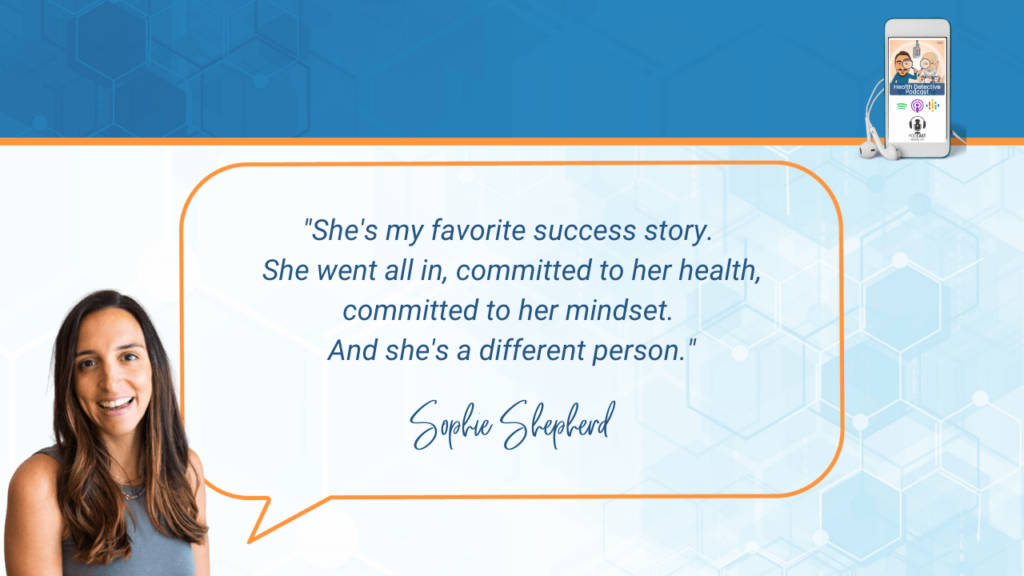
So, she’s my favorite success story. She went all in, committed to her health, committed to her mindset. And she’s a different person.
Where to Find Sophie Shepherd
[00:43:40] Detective Ev: Oh, that’s beautiful. It’s so much fun talking to the FDNs that are experienced, right? Because we have new ones on all the time and that’s great. We love highlighting them too. But when someone’s been through this and you work with a lot of clients, I love how that story just stuck out so quickly. Like you knew exactly who it was. So, it’s amazing seeing stuff like that.
It is a personal development journey, and everything gets better. If you can go through this, it’s tough. But the changes that you need to make to overcome these chronic health challenges, it requires you to change as a person. It’s not just as simple as removing a food or whatever. You got to deal with the social aspects. You got to give up old habits. That’s a personal development thing.
Sophie, this has been amazing. Where the heck can people find you if they’re like, okay, yeah, this is my girl, I got to work with her.

[00:44:20] Sophie Shepherd: Everything is, She Talks Health. So, my podcast, we’re relaunching it in 2024, but there’s tons of resources there for the last three years.
My website, shetalkshealth.com. And I’m on Instagram. You can DM me. Or you can email me at Sophie@shetalkshealth.com. I’m happy to have a conversation with you. Book a call with me and see if it’s the right fit. No pressure.
Signature Podcast Question – Slow Down
[00:44:43] Detective Ev: Our signature question on the show, just to finish up here, my friend. Especially as someone who’s very well versed, I’m always interested in these answers.
If you could wave a magic wand and you could get every single person in this world to either start doing one thing for their health or you can force us to all stop doing one thing for our health, what is the one thing that Sophie Shepherd gets us to do?
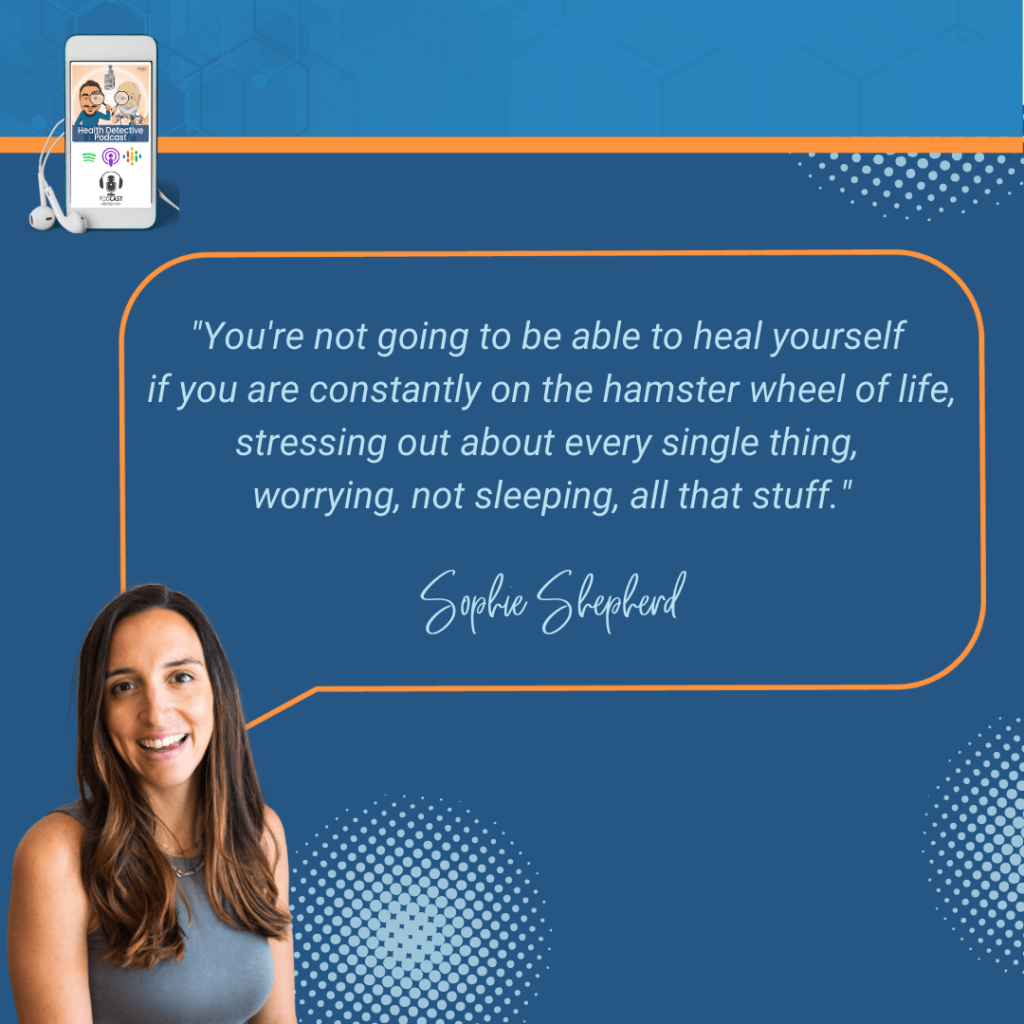
[00:45:05] Sophie Shepherd: Slow down. Slow down. You’re not going to be able to heal yourself if you are constantly on the hamster wheel of life, stressing out about every single thing, worrying, not sleeping, all that stuff. You gotta slow down.
I know how big a deal that is. But even if it’s for five minutes a day, find some quiet, find some peace. That’s like probably the hardest thing I could tell someone to do and it’s the most important.
[00:45:38] Detective Ev: It’s always the people who have the most knowledge in their brains on this show, the most experience, that end up giving you the most seemingly simple answers.
Labs are great. Protocols are awesome. But remember, if you’re not doing this kind of stuff, you’re shooting yourself in the foot. There’s no point in the expensive labs and protocols until we get some of this stuff down. And that’s stuff that FDNs can work with you on.
So SheTalksHealth.com if you’d like to work with Sophie.
Thank you so much for coming on today and bringing the fricking energy. That was great.
[00:46:06] Sophie Shepherd: You’re welcome. I’m always here for it, Evan. Thanks.
Conclusion
You can always visit us at functionaldiagnosticnutrition.com, on YouTube @FDNtraining, on Instagram @fdntraining, or on Facebook @FunctionalDiagnosticNutrition.
For more informational and functional health-oriented podcasts like this one, go to functionaldiagnosticnutrition.com/health-detective-podcast/.
To learn more about us, go to functionaldiagnosticnutrition.com/about-fdn-functional-testing/.

